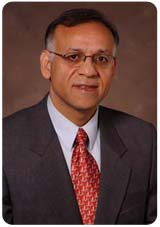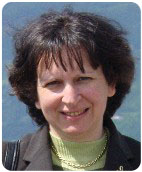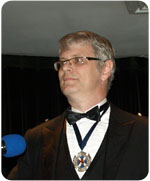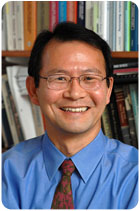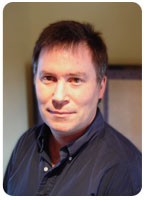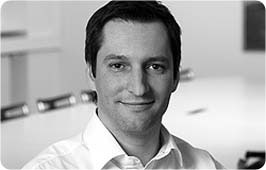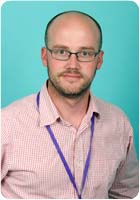Invited Speakers
Ahmad Safari, Rutgers University
Advances on Development of Functional Materials by Fused Deposition Modeling
Professor Ahmad Safari holds a Ph.D. degree in Solid State Science from the Pennsylvania State University. He is a distinguished Professor of Materials Science and Engineering, and Director of Glenn Howatt electrocermaic laboratory at Rutgers University. His main field of interest includes: Solid Freeform Fabrication of advanced functional materials, electroceramic materials for dielectric, piezoelectric and ferroelectric applications, thin and thick films, and ceramic – polymer composites for transducers, sensors, and actuators. Professor Safari has published over 400 articles and book chapters and edited a book, and has been granted 20 U.S. patents. He is a Fellow of the IEEE, American Ceramic Society, and World Academy of Ceramics. He was past president of the IEEE-UFFC society, and presently leading UFFC society’s three symposia. Professor Safari has been awarded Ferroelectrics recognition award for his work on novel ceramic polymer composites, and US-Japan Bridgeman award for his leading role on US-Japan conferences on dielectric and piezoelectric materials.
Anath Fischer, Technion, Israel Intstitute of Technology
A 3D interactive multi-scale inspection system for material micro-structures using SEM stereo images
Prof. Anath Fischer has been a faculty in the Department of Mechanical Engineering at the Technion–Israel Institute of Technology (IIT) since 1994. She has supervised 25 graduate students and is currently leading a group of eight researchers and graduate students. Her major research interests are computational metrology and virtual and rapid prototyping for engineering and medical applications. During the last ten years, she and her team have developed methods for: a) Geometric processing and surface/volumetric reconstruction of scanned data; and b) Geometric modeling for mechanical analysis. Prof. Fischer has published over 145 papers in academic journals, including IEEE CAD J., ASME Trans. JCISE, CIRP, IJNME, VPP and at international conferences, including Shape Modeling and App., Solid Modeling and Appl. She is on the editorial boards of ASME Trans. JCISE and Virtual and Physical Prototyping journals. She has been program chair, conference co-chair and IPC member in international including the several bi-international conferences. Prof. Fischer has received the Gutwirth (2003) and Taub (2006) awards for excellence in research. She has also been involved in international scientific and industrial projects across Europe including EU projects. She was also involved in medical projects with hospitals that relates to developing of diagnostic system for large-scaled micro-structures.
Boris N. Chichkov, Leibniz University
Nano and Bio RAP
Graduated with honors and received PhD in Physics from Moscow Institute of Physics and Technology. Started his scientific carrier at P.N. Lebedev Institute of Russian Academy of Sciences in Moscow and later worked in many research centers abroad. At present, Professor in Physics at Leibniz University Hannover and Head of Nanotechnology Department at the Laser Zentrum Hannover e.V.
Scientific areas: laser physics and laser applications, quantum and nonlinear optics, nano- and biophotonics, nanoengineering, biomedical implants and devices, tissue engineering and regenerative medicine.
Deon de Beer, Vaal University of Technology
“Idea 2 Product lab” – A low cost alternative to introcuce AM in South Africa.
He has published extensively on topics in product development, technology transfer, innovation and research development and commercialization. He is a rated researcher with the NRF, is the founder of the Centre for Rapid Prototyping and Manufacturing (CRPM), Product Development Technology Transfer Centre and FabLab at the CUT, and serves on the editorial boards of various journals. Deon also is a visiting professor at the IPT Leiria, Extraordinary Professor at CUT, a member of the Centre for Rapid & Sustainable Product Development at IPT Leiria, and has extensive international networks in the Additive Manufacturing research community. Since joining the VUT, Deon has established a Direct Digital Manufacturing Centre, Design Centre and has just founded the VUT’s Idea2Product Lab® concept.
Gyeong-Man Kim, School of Engineering of the University of Navarra
Patterned electrospun nanofibrous scaffolds for NanoMedicine
Gyeong-Man Kim is a Full Professor of the Materials Department at the School of Engineering of the University of Navarra in San Sebastian, Spain. He also leads a Group of NanoMedicine in Tissue Engineering Unit at CEIT since 2010. He received his PhD (1996) in the Department of Physics at the Martin-Luther University Halle-Wittenberg (MLU) in Germany. After serving as a Group Leader for Toughened Plastics at MLU he worked as a Senior Research Fellow (equivalent to Research Professor) in Dutch Polymer Institute at the Technical University of Eindhoven, the Netherlands (1998-2000). During 2000-2002 he took a position as a Visiting Scientist in the Institute of Materials Science, University of Connecticut (USA). Afterwards he came back to Germany serves as a Lecturer at the Department of Materials Science in MLU. In 2007 he received a “Habilitation (Dr.rer.nat.habil.)” as a Second Doctorate the Institute of Physics in MLU and also awarded a title of Privat-Dozent (Assistant Professor). He leaded a group of Bionanofiber at the Fraunhofer Institute Cell Therapy and Immunology in Leipzig, Germany (2009-2010). Currently his focus is extensively related to the combination of medicine with nanotechnology, which opens a new research field of so-called NanoMedicine. The main objectives of his group are the production and development of high-duty scaffolds by means of electrospinning nanotechnology for tissue engineering and regenerative medicine as well as the transfer of therapeutics derived thereby into clinical applications.
Ian Gibson, National University of Singapore
Additive Manufacturing: A discussion on Sustainability
Dr. Ian Gibson is Associate Professor at the National University of Singapore and member of the Centre for Rapid and Sustainable Product Development, Leiria, Portugal. He has been active in the Additive Manufacturing community for almost 20 years and has a number of credits to his name. These include the establishment of the Rapid Prototyping Journal, the setting up of the Global Alliance of Rapid Prototyping Associations (GARPA), a number of books and book chapters, including the popular Additive Manufacturing book published by Springer. He has also published widely on his research, which in recent years is mostly directed towards medical applications, including tissue engineering. He maintains an active interest in both virtual and physical product development.
Jean-Pierre Kruth, K.U.Leuven
Combining additive and subtractive laser manufacturing: selective laser melting, ablation and remelting
Prof. Dr. Ir. Jean-Pierre KRUTH is full professor at the Catholic University of Leuven (K.U.Leuven, Belgium), where he is responsible for Production Engineering research and education at the division PMA of the Department of Mechanical Engineering (Recipient of the 1998 CASA/SME University LEAD Award). His activities involves: CAD/CAPP/CAM, production processes, metal cutting, sheet metal manufacturing, non-traditional machining (EDM and laser machining), rapid prototyping, additive manufacturing, reverse engineering, dimensional metrology and quality control. He obtained his Ph.D. at K.U.Leuven in 1979 and worked at the Institut Technologi Bandung (ITB, Indonesia) from 1979 till 1982. He was research engineer at the Scientific and Technical Center of the Belgian Metalworking Industry (CRIF/WTCM/Sirris) and half-time consulting engineer at the national ‘CAD/CAM Stand-By’ service for industry (IWONL), till being nominate full-time at K.U.Leuven in 1987. He is Fellow of CIRP (International Academy for Production Engineering), Fellow of SME (Society of Manufacturing Engineers, Dearborn, USA), Honorary member Romanian Society of Mech. Eng., Member IMEKO/BEMEKO (International/Belgian Measuring Confederation), member K.VIV and BSMEE, founding board member of several companies including Materialise (1990-1997), Metris (1995-2009, now Nikon Metrology) and LayerWise (2008). He has been awarded among others the F.W. Taylor Medal (CIRP), the Knight of the Laser Technology award (Erlangen, D) and the Industrial and Academic Career Award in Virtual and Rapid Prototyoing (Leiria, Portugal).
Jung-Hoon Chun, Massachusetts Institute of Technology
A Role of Rapid Prototyping in the Innovation Economy
Dr. Jung-Hoon Chun is director of the Laboratory for Manufacturing and Productivity and a professor of mechanical engineering at the Massachusetts Institute of Technology (MIT). He has also been a Faculty Fellow of the Singapore-MIT Alliance. He received a B.S. from Seoul National University, an M.A.Sc. from the University of Ottawa, and a Ph.D. from MIT, all in mechanical engineering. As a member of the MIT Mechanical Engineering faculty since 1989, Dr. Chun has over 100 publications and patents to his credit. His research focuses on the development of innovative manufacturing processes, particularly in droplet-based manufacturing, microelectronics manufacturing, automotive manufacturing, polymer-based microfluidic devices manufacturing, fuel cell manufacturing and pharmaceutical manufacturing. One (US Patent No. 5,266,098) of his inventions has commercially been adopted worldwide in producing solder balls for electronics packaging. Dr. Chun has also been instrumental in forming numerous industry-MIT research consortia and international collaborative research programs. He is a Fellow of the International Academy for Production Engineering (CIRP: College International pour la Recherche en Productique).
Neri Oxman, Massachusetts Institute of Technology
How to Print a Tree: Functionally Graded Digital Fabrication
Architect and designer Neri Oxman is the Sony Corporation Career Development Professor and Assistant Professor of Media Arts and Sciences at the MIT Media Lab where she directs the Mediated Matter research group. Her group explores how digital design and fabrication technologies mediate between matter and environment to radically transform the design and construction of objects, buildings, and systems. Oxman’s goal is to enhance the relationship between the built and the natural environment by employing design principles inspired by nature and implementing them in the invention of digital design technologies. Areas of application include product and architectural design as well as digital fabrication and construction. Oxman was named to the “top 20 most influential architects to shape our future” by ICON (2009) and was selected as one of the “100 most creative people” by FASTCOMPANY (2009). In 2008, she has been named “Revolutionary Mind” by SEED Magazine. Oxman received her PhD in Design Computation as a Presidential Fellow from MIT, where she developed the theory and practice of Material-based Design Computation. Prior to MIT, Oxman received her diploma from the Architectural Association (RIBA 2) after attending the Faculty of Architecture and Town Planning at the Technion Israel Institute of Technology and the Department of Medical Sciences at the Hebrew University in Jerusalem. Her work has been exhibited at MoMA (NYC) and is part of the museum’s permanent collection. Recent work has been included in Centre Pompidou’s permanent collection; other exhibitions include the Museum of Science (Boston, MA), FRAC Collection (Orleans, France), and the 2009 and 2010 Beijing Biennale. She received numerous awards including a Graham Foundation Carter Manny Award, the International Earth Award for Future-Crucial Design, a METROPOLIS Next Generation Award, and many others.
Olaf Diegel, Auckland University of Technology
Additive Manufacturing, The New Frontier
Professor Olaf Diegel is an educator and a practitioner of engineering product development with an excellent track record of developing innovative solutions to engineering problems. In his role at Auckland University of Technology, he is director of the Creative Industries Research Institute, an interdisciplinary research institute that crosses over between Engineering, Art & Design, Computing and Communications. He is widely published in the areas of additive manufacturing, product development, smart house technologies, mechatronics and predictive health systems. In his consulting practice he develops a wide range of products for New Zealand and International companies. Over the past 10 years he has developed over 40 successfully commercialized new products including innovative new theatre lighting products, security and marine products and several home health monitoring products. He has received numerous awards including two gold medals at the 2010 Concours Lépine in Paris, the 2009 NZ nomination in the E-Health & Environment category at the World Summit Awards, the 2008 Bayer Innovation Awards in the Health and Science category for his innovative work in the area of predictive health monitoring products, and the 2006 New Zealand Engineering Excellence Awards Engineering Innovator of the Year prize.
Olivier Jay, Danish Technological Institute
Strategic implementation of Additive Manufacturing, more than a technological question
Product development, industry consultant, project leader and speaker, Olivier Jay is the head of the section of Additive Layer Manufacturing activities in the Danish Technological Institute. For the past 13 years, Olivier has focused on the product design for rapid manufacturing and prototyping. President of the Danish RPT association, member of the GARPA community, Olivier has focused on the research and to educate industry. He has been given conferences in most of Europe, and he is making courses on RM to the Danish industry and Engineering school. He is Project leader of the Compolight project under the FP7 MNP programs and from 2 Danish Projects on RM. Member of the management board of the European RM working group under the MANUFUTURE platform. He is also project leader for the Danish F-Mat project about functional materials. Developing high end product for the industry, he has been working in the area from design for manufacturing to virtual reality or reverse engineering.
Russell Harris, Loughborough University
Physical simulation phantoms for otolaryngology surgery training
Dr Russell Harris, Senior Lecturer, Wolfson School of Mechanical and Manufacturing Engineering, Loughborough University. Dr Harris specialises in materials and manufacturing process research, conducted through European and nationally funded research projects. His achievements in these areas of research are demonstrated by various sources, including 30+ peer reviewed journal publications. He has received grant awards from EPSRC, EC Framework Programme, and Department of Health totalling over £1.7 Million as Principal Investigator, and £500,00 as Co-Investigator. He has graduated 7 PhD’s with another 2 currently ongoing. Dr Harris has previously developed several bespoke Additive Manufacturing techniques for medical applications. He has been awarded the Institute of Mechanical Engineers Donald Julius Groen Prize for research in Structural Technology and Materials (2003) and the Institute of Mechanical Engineers Professional Engineering Publishing Award for research in Engineering in Medicine (2007). He holds the position of Honorary Senior Lecturer at Nottingham University Hospitals NHS Trust.
Suman Das, Georgia Institute of Technology
Direct Digital Manufacturing of Airfoils
Dr. Suman Das is a Professor and Woodruff Faculty Fellow, and Director of the Direct Digital Manufacturing Laboratory in the Woodruff School of Mechanical Engineering at the Georgia Institute of Technology in Atlanta. He received his Ph.D. in Mechanical Engineering from The University of Texas at Austin in 1998, and completed a post-doctoral fellowship there during 1999-2000. Dr. Das is an internationally recognized researcher in the fields of direct digital manufacturing, rapid prototyping, and large-area micro/nanostructure fabrication. He has conducted over 20 years of research in these areas. His contributions have been recognized through numerous awards including the University of Texas Outstanding Dissertation Award, the National Science Foundation Faculty Early Career Development Award, and the Society of Manufacturing Engineers Outstanding Young Manufacturing Engineer Award. His current research focuses on advanced manufacturing, materials science, and computational modeling covering all material classes and length scales with applications in the aerospace propulsion, biomedical, energy and nanotechnology sectors.
Sung-Hoon Ahn, Seoul National University
Manufacturing of smart skeleton structures using 3D printer
Sung-Hoon Ahn received a B.S. in Aerospace Engineering from the University of Michigan, Ann Arbor in 1992, an M.S.. in Aeronautics and Astronautics from the Stanford university in 1994, and a Ph.D. in Aeronautics & Astronautics (minor in Mechanical Engineering) from the Stanford university in 1997. He was on the faculties of Gyeongsang National University from 2000 to 2003. In 2003 he joined Seoul National University, where he has been a full Professor of School of Mechanical and Aerospace Engineering since 2010. Dr. Ahn’s research interests are in Rapid Prototyping, Internet-based Design and Manufacturing, Micro/Nano Fabrication, Nano Composite, Design for Manufacturing, and Green Manufacturing. He published over 90 journal-class articles in these areas. For his research accomplishments he has been honored with the Highly Commended Award, Literati Club from Rapid Prototyping Journal in 2003, the Bagam Paper Award from the Korean Society of Mechanical Engineers in 2005, the Outstanding Academic Achievement Award from Korean Society for Precision Engineering in 2007, an Outstanding Teaching Award from Seoul National University in 2008, an Outstanding Research Award from Seoul National University in 2010, and IJPEM Highly Commended Paper Award from International Journal of Precision Engineering and Manufacturing in 2010. He is an Editor of International Journal of Precision Engineering and Manufacturing (IJPEM), an Editorial Board of Rapid Prototyping Journal (RPJ) and Transactions of the Society of CAD/CAM Engineers, the President of Green Manufacturing Technology division of KSPE, President of Seoul Chapter of University Industrial Technology Force (UNITEF), the Director of Publication, Korean Society for Precision Engineering, a member of KSME (Korean Society of Mechanical Engineers), KSPE (Korean Society of Precision Engineering), KSCM (Korean Society for Composite Materials), KSAE (Korean Society of Automotive Engineers), Society of CAD/CAM Engineers, and ASME (American Society of Mechanical Engineers). In 2011 he was elected as an associate member of CIRP(International Academy for Production Engineers).
Terry Wohlers, Wohlers Associates
A New Era for Additive Manufacturing
Terry Wohlers is principal consultant and president of Wohlers Associates, Inc., an independent consulting firm he founded 25 years ago. Through this company, Wohlers has provided consulting assistance to more than 170 organizations in 23 countries. He has authored 375 books, articles, and technical papers and has given 80 keynote presentations on five continents. Wohlers has been quoted or cited in the BusinessWeek, CNBC Business, CNNMoney, Discovery News from the Discovery Channel, The Economist, Financial Times, Fortune, Forbes, Los Angeles Times, Scientific American, The Wall Street Journal, and countless domestic and foreign magazines, journals, and newspapers. In June 2010, Sky News (Sydney, Australia) conducted a live, nationwide interview broadcast with Wohlers. In 2007, more than 1,000 industry professionals from around the world selected Wohlers as the #1 most influential person in rapid product development and additive manufacturing. In 2004, Wohlers received an Honorary Doctoral Degree of Mechanical Engineering from Central University of Technology (Bloemfontein, South Africa).

